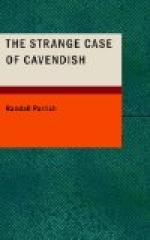Do not be angry. I had the best of reasons. Meet me near the lower bridge at three o’clock. Very important.
S. D.
He read the lines over again, his lips emitting a low whistle, his eyes darkening with sudden appreciation. Slowly he tore the paper into strips, crossed the room, and flung the remnants into the stove. It had been a trick, then, a bit of play-acting! But had it? Was not this rather the real fraud—this sudden change of heart? Perhaps something had occurred to cause the girl to realise that she had made a mistake; to awaken her to a knowledge that a pretence at friendship would serve her cause better than an open break.
This note might have a sinister purpose; be intended to deceive. No! He would not believe this. All his old lurking faith in her came back in a flash of revelation. He would continue to believe in her, trust her, feel that some worthy purpose had influenced her strange action. And, above all, he would be at the lower bridge on the hour set. He was at the desk when Timmons returned.
“What do I owe you, old man?”
He paid the bill jokingly and in the best of humour, careful to tell the proprietor that he was leaving for his mine and might not return for several days. He possessed confidence that Timmons would make no secret of this in Haskell after his departure. He was glad to notice that Beaton observed him as he passed the Good Luck Saloon and went tramping down the dusty road. He never glanced back until he turned into the north trail at the edge of town; there the path dropped suddenly toward the bed of the creek, and he was concealed from view. In the rock shadow he paused, chuckling grimly as he observed the New Yorker cross the street to the hotel, hastening, no doubt, to interview Timmons.
There was a crooked trail along the bank of the stream which joined the main road at the west end of the lower bridge. It led up the canon amid rocks and cedars, causing it to assume a strangely tortuous course, and its lower end was shadowed by overhanging willows. Along this Westcott lingered at the hour set, watchful of the road leading toward Haskell.
The only carriage belonging to the town livery passed soon after his arrival, evidently bound for the station, and from his covert he recognised Beaton lolling carelessly in the back seat. This must mean that the man expected arrivals on the afternoon train, important arrivals whom he desired to honour. There was no sign, however, of Miss Donovan; the time was up, yet with no evidence of her approach.
Westcott waited patiently, arguing to himself that her delay might be caused by her wish to get Beaton well out of the way before she ventured to leave the hotel. At last he strode down the path to the bridge, and saw her leaning over the rail, staring at the ripples below.
“Why,” he exclaimed in surprise, “how long have you been here?”




